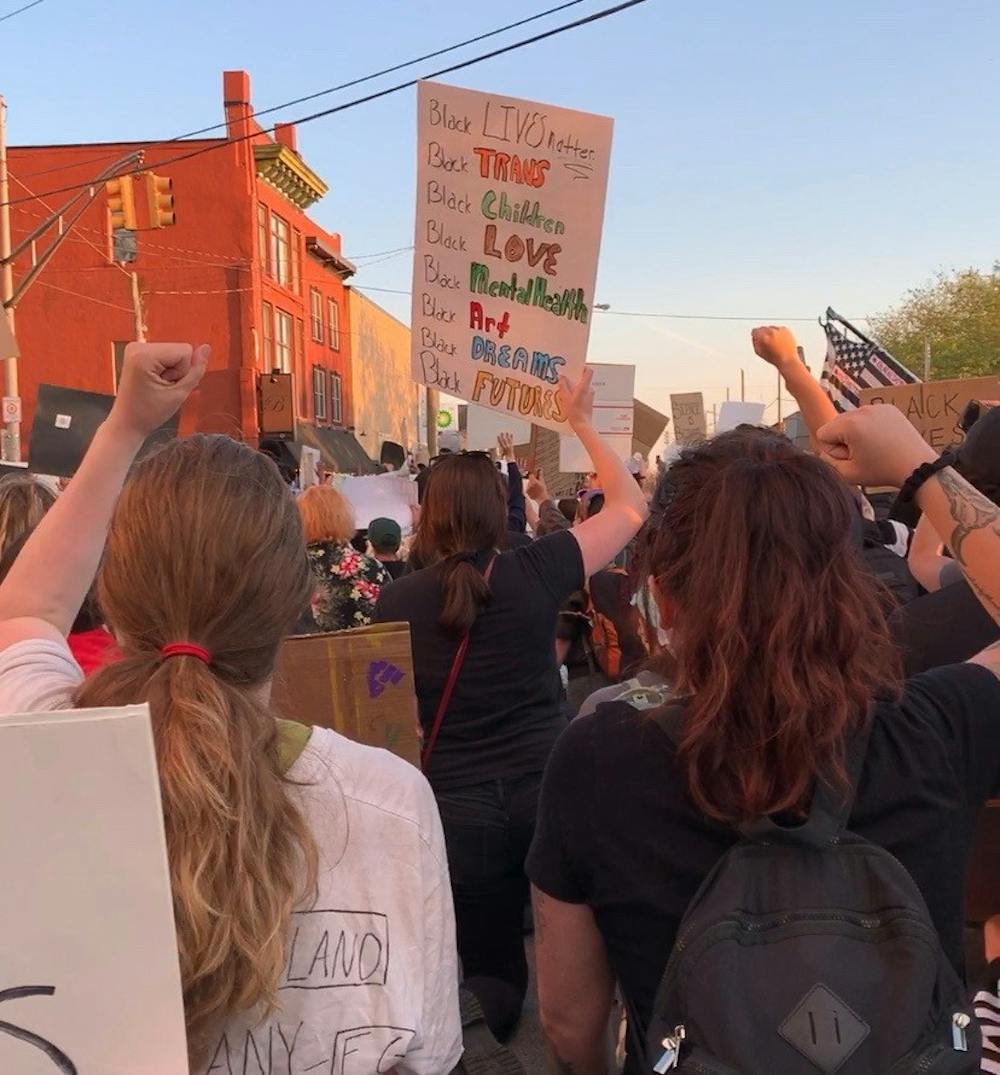By Camille Furst
Editor-in-Chief
Zane Thompson-Bradley broke down as he tried to speak. In the video call with over a hundred other participants, silence remained on every other end.
“I have to risk my life just to voice my opinion,” he said between cries.
And there, others wept with him.
The rising senior interactive multimedia major released his frustrations, saying that he’s tired of waiting for change. Since the death of George Floyd on May 25 and the subsequent protests throughout the nation, this has been a common sentiment among many. An outbreak of student activism from the College community has taken form — and the College’s administration has responded as well.
Administrators hosted a virtual event called ‘Can We Just Talk?’ on June 1 in an effort to give students the opportunity to voice their sentiments and concerns. This event came just hours after the College released a statement to the campus community in response to George Floyd’s death.
“For too long, too many in our country have turned a blind eye to racism in the hopes that it will simply go away,” the statement from College President Kathryn Foster and Vice President for Equity and Inclusion James Felton III read. “We cannot continue to ignore this problem. Racism is not just a person of color issue. It is everyone’s issue, which makes it everyone’s responsibility to actively work against it — today and every day.”

The statement also said that the College is “planning to launch an anti-hate initiative in the fall,” although no details were given on what this would entail.
In response, many students felt that the message remained empty of any action.
“Is that all? Is that all you have to say? ‘Too many in our country?’ You are one of them,” said Seva Galant, a rising junior health and exercise science major, in response to Foster in an Instagram post from the College’s official account. “How can I trust you when you say you support the oppressed when you are complicit with the oppression?”
Other students, like rising junior biology major Harish Rajagopal, feel that although the College isn’t doing enough, the right administrators are present to make change for the better.
“I know I’ve seen conflicting reports and conflicting opinions on Dr. Foster and their administration,” Rajagopal said. “I genuinely think they’re trying their absolute best and they’re doing everything they can to hear the student body’s concerns (and) hear the student body’s complaints.”
In an interview with The Signal on June 3, Foster said that while she did receive some negative feedback, she also received responses thanking her for the statement. Both Felton and Foster felt that an initial statement should consist of support rather than immediate action.
“We didn’t think that first email was the place for all that,” Foster said.
Both Foster and Felton described plans for the fall. One proposed plan is a voluntary “police community diversity group.” While the details are still to be determined, Felton said that planning will take place over the summer and an announcement will be made in the beginning of the fall semester.
Foster also said that the campus-wide email from Mark Forest, the assistant vice president for student affairs, health and wellness, was sent out in an effort to inform the student body of different resources offered by Mental Health Services throughout the summer.
Other plans being discussed by administrators include changes to the Bias Response Team to include more educational initiatives; a possible switch in the weekly updates to be called “Community Missives,” which will include information about advances made toward racial equality, rather than “Corona Missives,” and paying more attention to immediate services of support for students of color.
On the same day the College released the statement, the Office of Institutional Diversity, Equity and Inclusion (OIDEI) held the video call to open up a conversation with students on racial equality, the recent protests and the administration’s response. At its peak, 118 people were in attendance. The event included Foster, Felton and other administrators who fielded questions from students.
Many students, including rising senior elementary education and English dual major Tara Mild, wanted answers.
“There are a lot of efforts that the College can do to make things more transparent,” Mild said. “I’d like to ask that moving forward, the emails are transparent and recurrent, like the Corona Missive emails. Our students deserve to have acknowledgement of issues and what the College is doing to better the school community.”
In the meeting, students advocated for different actions that could be taken, including required training for faculty and students and a change in curriculum requirements to add more diversity education.
While no details were given to students in the video call, the administrators said that action will be taken over the summer and into the fall semester.
“It is notable and it is noteworthy how effective and how sophisticated our students are about their activism, and they need to know that we hear it, and in fact, we’ve acted on it,” Foster said. “And that ... in our actions, they can see their work. Their activism has had an impact. Do we have a ways to go? Absolutely. … We welcome that activism, not only for the historical reasons, but for the very practical reasons of making us a better campus.”







